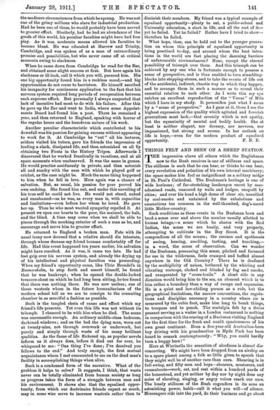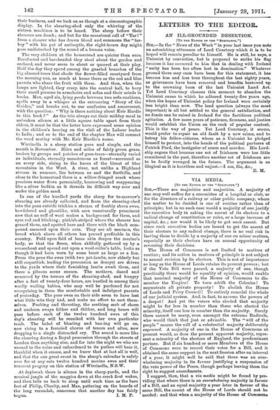THINGS FELT AND SEEN ON A SHEEP STATION.
THE impression above all others which the Englishman new to the Bush receives is one of stillness and space. The stillness is such that he can hear, or thinks he can hear, every revolution and pulsation of his own internal machinery; the space makes him feel as insignificant as a solitary midge in St. Paul's Cathedral. The Bushman's heritage is one of wide horizons ; of far-stretching landscapes uncut by mac- adamised roads, unscored by walls and hedges, unspoilt by cities ; and over his head a. high dome of clear air, unsullied by coal-smoke and untainted by the exhalations and emanations too common in the well-thumbed, dog's-eared little Mother-country.
Such conditions as these create in the Bushman born and bred a sense over and above the number usually allotted to human beings,—a sense which he shares with the Red Indian, the sense we are busily, and very properly, attempting to cultivate in the Boy Scout. It is the compendium of all the senses ; the essence and apotheosis of seeing, hearing, smelling, tasting, and touching,— in a word, the sense of observation. Can we wonder if the Bushman, possessing this sense, pitched and focussed for use in the wilderness, feels cramped and baffled almost anywhere in the Old Country ? There he is deafened by the multiplicity of noises, bothered by the whirling and vibrating zoetrope, choked and blinded by fog and smoke, and exasperated by "cross-trails." A short ride in any direction would bring him to the sea, an clement which is to him rather a boundary than a way of escape and expansion. He is a quiet and law-abiding person as a rule, but the geographical limitations, the narrow conventions, the regula- tions and discipline necessary in a country where air is measured by the cubic foot, make him long to break things, to trespass and to poach. The nostalgia felt by a Swiss peasant serving as a waiter in a London restaurant is nothing in comparison with the craving of a Bushman visiting England for the first time for the fresh and sunlit spaciousness of his own great continent. Even a five-year-old Australian-born boy driving with his grandmother in Hyde Park has been heard to remark contemptuously: "Why, you could hardly turn a buggy here!"
Here at Wirrinella, the sensation of aloofness is almost dis- concerting. We might have been dropped from an airship on to a spare planet among a folk so little given to speech that they might well be of another race than ours. Shearing is in full swing, and fifty men and boys—shearers, tnusterers, and rouseabouts—work, eat, and rest within a hundred yards of the homestead, and yet neither by day nor by night does any noise of shouting, singing, or angry voices reach our ears. The lonely stillness of the Bash engenders in its sons an astonishing power, habit—call it what you will—of silence. Messengers ride into the yard, do their business and go about their business, and we look on as though at a cinematographic display. In the shearing-shed only the whirring of the sixteen machines is to be heard. The sheep before their shearers are dumb ; and but for the occasional call of " Tar I" from a shearer who has drawn blood and summons the " tar- boy " with his pot of antiseptic, the eight-hours day might pass undisturbed by the sound of a human voice.
The very children at the homestead are quieter than ours. Barefooted and bareheaded they steal about the garden and orchard, and never seem to shout or quarrel at their play. Half the day they spend among the gnarled branches of the big almond-trees that shade the flower-filled courtyard from the morning sun, as much at home there as the red and blue parrots who share the fruit with them. And then, when the lamps are lighted, they creep into the central hall, to bury their small persons in armchairs and sofas and their minds in
books. Max, aged six, lying perdu between two sofa-cushions, spells away in a whisper at the entrancing "Story of the
Guides," and breaks out, to our confusion and amazement,
with the question : "Why is there nothing about Keir Hardie in this book P" As the trio always eat their midday meal in
unbroken silence at a little square table apart from their elders, it must be that the latter have expressed some opinion in the children's hearing on the visit of the Labour leader to India ; and so to the end of the chapter Max will connect the word mutiny with Mr. Keir Hardie's name.
Wirrinella is a sheep station pure and simple, and the month is November. Miles and miles of fairly green grass, broken by groups and patches of gum-trees—eternally varied as individuals, eternally monotonous as forest—surround us on every side, rising to the knees of the bluest of blue mountains ha the West. A river, not unlike a Highland stream in summer, lies between us and the foothills, and close to the homestead there is a willow-fringed creek where precious water flows perennially, burrowing and reappearing like a silver bodkin as it threads its difficult way over and under the golden sand.
In one of the hurdled yards the sheep for to-morrow's shearing are already collected, and from the shearing-shed into the pens outside trickles a stream of freshly shorn ewes, bewildered and ghostlike, with ears unnaturally prominent now that no ruff of wool makes a background for them, and eyes red and blinking ; pinkish-striped where the shearer has grazed them, and spotted here and there with the black com- pound smeared upon their cuts. They are all merinos, the breed which above all others ha.s proved profitable in this country. Fold upon fold of loose skin drapes the merino's body, so that the fleece, when skilfully gathered up by a rouseabont and spread out upon a wool-roller's table, looks as though it had been worn by some beast as large as a lion. From the pens the ewes (with two pet-lambs, now elderly but still coquettish, leading the procession as decoys) are driven to the yards where their famishing lambs await them, and there a p-iteous scene ensues. The mothers, dazed and unnerved by the terrors of the shearing-shed, and hungry after a fast of twenty-four hours, are hustled in among their woolly wailing babies, who may well be pardoned for not recognising in them the comfortable and indulgent parents of yesterday. The poor ewes on their side seem to have lost what little wits they had, and make no effort to sort them- selves. Pushing and thrusting, the seething mob of shorn and unshorn sways hither and thither, and long hours will pass before each of the twelve hundred ewes of this day's shearing will be reunited with her own particular lamb. The babel of bleating and baa-ing will go on, now rising to a frenzied chorus of tenors and altos, now dropping to a single distracted cry. The sound is more like the cheering during a Royal procession through the streets of London than anything else, and far into the night we who are unused to the noise and unhardened to its pathos will bear it, thankful when it ceases, and we know that at last all is well, and that the one great event in the sheep's calendar is safely over for at any rate twelve hundred merino ewes and their innocent progeny on this station of Wirrinella, N.S.W.
At daybreak there is silence in the sheep-yards, and the musical jangle of the magpies down at the creek first wakes, and then lulls us back to sleep until such time as the bare feet of Philip, Charity, and Max, pattering on the boards of the long verandah, announce that another day has fairly























































 Previous page
Previous page